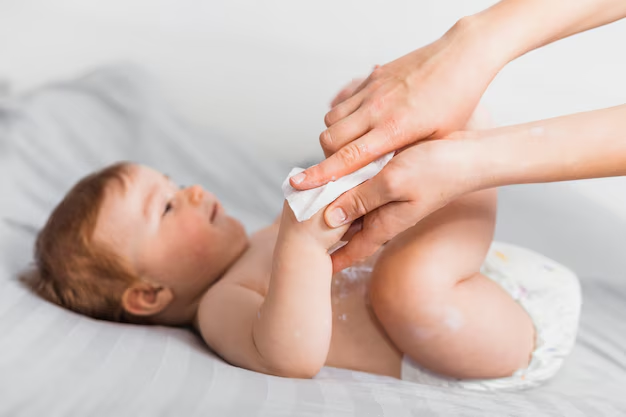Navigating Baby Acne: Essential Insights for Worried Parents
As a new parent, nothing may seem more precious than your newborn's soft, delicate skin. So, when you spot tiny red bumps on your baby's face, it’s natural to be alarmed. However, these blemishes, commonly known as baby acne, are a typical occurrence for many infants. Here’s an engaging, comprehensive look into the world of baby acne, offering clarity, context, and comfort for new parents seeking answers.
Understanding Baby Acne
What is Baby Acne?
Baby acne is a common and generally harmless skin condition characterized by small red or white bumps on a newborn’s face. It typically affects babies within the first few weeks of life, and while it may be unsightly, it rarely causes the baby any discomfort.
Causes of Baby Acne
The primary cause of baby acne isn't entirely understood, but it is thought to be related to maternal hormones that pass to the baby during pregnancy. These hormones stimulate the baby's oil glands, leading to acne-like spots. Additionally, some experts believe that the skin’s reaction to yeast in the skin’s natural microbiome might play a role.
How Long Does Baby Acne Last?
Typically, baby acne resolves naturally within a few weeks to months. In rare cases, it can persist longer, which may require consultation with a pediatric dermatologist.
Caring for Your Baby’s Skin
Simple Steps to Manage Baby Acne
While it’s crucial to remember that baby acne doesn’t require medical treatment and will resolve on its own, there are gentle skincare practices you can adopt to maintain your baby’s delicate skin.
- Keep it Clean: Gently wash your baby’s face with warm water and a mild, baby-friendly soap every day.
- Pat, Don’t Rub: When drying your baby's skin, gently pat it dry with a soft towel instead of rubbing.
- Moisturize Wisely: Use a light, hypoallergenic moisturizer if necessary, but avoid heavy lotions or oils that may clog pores.
- Resist the Urge to Squeeze: It might be tempting, but never squeeze or pick at the acne, as this can lead to infection or scarring.
Products to Avoid
Certain products could irritate your baby’s skin or exacerbate acne. Avoid using adult or acne-specific skincare products on your baby. These products often contain ingredients that are not suitable for a newborn’s sensitive skin.
When to Seek Medical Advice
Recognizing When It’s Not Baby Acne
If the bumps on your baby’s skin don’t seem to be improving or are accompanied by other symptoms, it might be something other than acne, such as eczema or a different skin condition.
It’s important to consult a healthcare professional if you notice:
- Severe redness or swelling
- Pimples spread beyond the face
- Accompanying fever or irritability
Specialist Intervention
In rare, persistent cases, a pediatrician might refer you to a dermatologist for specialized care. Treatments are infrequent but can include mild topical medications designed specifically for infants.
Understanding Related Skin Conditions
Milia
Milia are tiny white bumps commonly found on a baby’s nose, chin, or cheeks, caused by trapped keratin. They are very similar to baby acne and also resolve without treatment.
Eczema
Eczema, or atopic dermatitis, can appear as red, scaly patches and is different from baby acne. It's typically itchy and might require specific treatments and lifestyle adjustments.
Myths and Misconceptions
Debunking Myths About Baby Acne
There are several misconceptions about baby acne. Recognizing these can help reduce unnecessary worry and stress.
- Myth 1: Baby acne is caused by poor hygiene.
- Truth: Baby acne is not linked to poor hygiene; it’s a natural, hormone-driven condition.
- Myth 2: Breast milk topically cures baby acne.
- Truth: While breastfeeding has numerous health benefits, topical application of breast milk hasn’t been scientifically proven to treat baby acne.
- Myth 3: Baby acne is a sign of allergies.
- Truth: Baby acne is not an allergic reaction and is unrelated to environmental pollutants or allergens.
Supporting Your Baby’s Health
A Holistic Approach
While baby acne will often disappear on its own, supporting your baby’s overall health can contribute to better skin.
- Nutrition: If breastfeeding, maintain a balanced diet to ensure nutrient-rich milk.
- Hydration: Keep your baby well-hydrated for optimum skin health.
- Comfort: Dress your baby in soft, breathable fabrics.
Encouraging a Calm Environment
Stress (yes, even in babies!) can affect skin conditions. Promote a calm environment with regular sleep schedules and soothing routines to help your baby stay relaxed.
What Parents Can Do: A Caregiver’s Checklist
Navigating the early stages of a baby's life can be overwhelming, but here are a few actionable steps:
- Observe the affected areas without stress.
- Maintain gentle skincare.
- Use baby-specific products only.
- Foster a calm and nurturing environment.
- Consult a pediatrician if symptoms change or worsen.
Final Take: Embrace the Journey
As the days pass, you’ll watch your baby grow and develop, with baby acne becoming a faint memory. The key is patience, trust in your parenting instincts, and the knowledge that you are doing everything you can to provide the best care for your little one.
Quick Reference Guide to Baby Acne Care 🌟
- Gentle Washing: Use warm water daily. 💧
- Drying Technique: Pat, don’t rub! 🧸
- Product Selection: Stick to baby-specific items. 🚼
- Resist Squeezing: Hands off! 🚫
- Consultation: See a doctor if concerned. 👩⚕️
Remember, every baby is unique, and what works for one might not work for another. As you embark on this rewarding journey, always cherish the little moments and milestones. 💖

